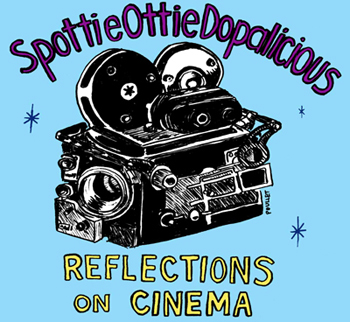SpottieOttieDopalicious Reflections on Cinema : Jonathan Moody
 Therein, the antagonist, Missed Opportunity, takes a bow reveling in Mo-wan and Li-zhen’s torture as well as the audience’s. His argument might allude to this simplistic and callous notion: If Mo-wan and Li-zhen truly belonged together, then they would’ve already tied the knot. The Missed Opportunity character, however, that’s present in Mood is much tamer than the one that’s present in Days of Being Wild but is credited with a different name: The Perfect Moment (Days is a quasi-prequel to Mood).
Therein, the antagonist, Missed Opportunity, takes a bow reveling in Mo-wan and Li-zhen’s torture as well as the audience’s. His argument might allude to this simplistic and callous notion: If Mo-wan and Li-zhen truly belonged together, then they would’ve already tied the knot. The Missed Opportunity character, however, that’s present in Mood is much tamer than the one that’s present in Days of Being Wild but is credited with a different name: The Perfect Moment (Days is a quasi-prequel to Mood).
Released in 1991, Days features a younger Maggie Cheung who also plays a woman named Su Li-zhen. She falls hard for a manipulative playboy (the late Leslie Cheung). In his initial pursuits of Li-zhen, Leslie’s character—“Yuddy”—stops by the stadium concession stand where Li-zhen works. Relentless in his efforts, he shows up at the same time everyday until he cracks through her seemingly impervious coy disposition. Exuding arrogance Yuddy goes so far as to suggest that Li-zhen will remember the exact time that they’ve met forever. Not only does Li-zhen remember the exact moment Yuddy has entered her life but she’s also haunted by it after he dumps her for a vapid showgirl.
Tonally, Days of Being Wild is vastly different than In the Mood for Love. Days’s use of Hawaiian guitar music and slow-motion shots of palm trees implies that beneath the landscape’s cool surface lies an antihero who’s not so chill. Mood embraces the concept of nostalgia and modernity sharing the same space. In this sense, Wai pays slight homage to Sam Peckinpah’s body of work. With Wai’s vision, nostalgia (i.e. high-collared qipao dresses and Cantonese operas) and modernity (cramped apartments and Nat King Cole songs) co-exist whereas in Peckinpah’s vision nostalgia is snuffed out violently by modernity (the best examples of the latter occur in The Ballad of Cable Hogue and Bring Me the Head of Alfredo Garcia).
Earlier I’d alluded that Mood is a continuation of Days and it is—not in the traditional sense but in a post-modern one in which sequential story-arcs are repudiated and replaced in favor of more lyrical narratives that approach the structure of stand-alone vignettes (almost). For example, Days of Being Wild, In the Mood for Love, and 2046 (named after the hotel room where Tony Leung and Maggie Cheung rendezvous) form a loose trilogy that plays out much in the same way that South Korean filmmaker Chan wook-Park’s revenge trilogy does (Sympathy for Mr. Vengeance, Old Boy, and Sympathy for Lady Vengeance). In other words, one doesn’t necessarily have to see these films in chronological order. However, this doesn’t mean that these films aren’t dense either. In both 2046 and Lady Vengeance, there are a number of allusions that emerge: mainly previous characters. 2046 is extremely self-indulgent in that it references a metaphor from Days concerning a “legless bird”.
I say all this to encourage those unfamiliar with Wong Kar-Wai’s work to check him out. For those who thought about peeping his collection but flaked out after critics put him on blast for casting Norah Jones as the lead in his first American film (My Blueberry Nights), why not reconsider and start off with In the Mood for Love.
Jonathan Moody is a poet/cosmic funkateer who grew up in Ft. Walton Beach, FL and is currently grooving in Houston, TX. He received his Bachelor’s in psychology from Xavier University of Louisiana and received his MFA from the University of Pittsburgh.


